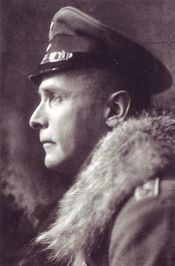Harry Graf Kessler
Born
in Paris, France
May 23, 1868
Died
November 30, 1937
Genre
Influences

|
Journey to the Abyss: The Diaries of Count Harry Kessler, 1880-1918
by
—
published
2011
—
8 editions
|
|

|
Berlin in Lights: The Diaries of Count Harry Kessler (1918-1937)
by
—
published
1961
—
30 editions
|
|

|
Walter Rathenau: His Life and Work
—
published
1930
—
32 editions
|
|

|
De dans op de vulkaan: Een keuze uit de dagboeken 1918 - 1933
|
|

|
Notizen über Mexico
—
published
1898
—
17 editions
|
|

|
Diario (1893-1937)
by |
|

|
In the Twenties: The Diaries of Harry Kessler
—
published
1971
—
3 editions
|
|

|
Erinnerungen eines Europäers
—
published
1936
|
|

|
Harry Graf Kessler Das Tagebuch (Zweiter Band 1892-1897)
|
|

|
Tagebuch 1880 - 1937: Tagebuch 1897 - 1905
by |
|
“Berlin. November 18, 1917. Sunday. I think Grosz has something demonic in him. This new Berlin art in general, Grosz, Becher, Benn, Wieland Herzfelde, is most curious. Big city art, with a tense density of impressions that appears simultaneous, brutally realistic, and at the same time fairy-tale-like, just like the big city itself, illuminating things harshly and distortedly as with searchlights and then disappearing in the glow. A highly nervous, cerebral, illusionist art, and in this respect reminiscent of the music hall and also of film, or at least of a possible, still unrealized film. An art of flashing lights with a perfume of sin and perversity like every nocturnal street in the big city. The precursors are E.T.A. Hoffmann, Breughel, Mallarmé, Seurat, Lautrec, the futurists: but in the density and organization of the overwhelming abundance of sensation, the brutal reality, the Berliners seem new to me. Perhaps one could also include Stravinsky here (Petrushka). Piled-up ornamentation each of which expresses a trivial reality but which, in their sum and through their relations to each other, has a thoroughly un-trivial impact.
All round the world war rages and in the center is this nervous city in which so much presses and shoves, so many people and streets and lights and colors and interests: politics and music hall, business and yet also art, field gray, privy counselors, chansonettes, and right and left, and up and down, somewhere, very far away, the trenches, regiments storming over to attack, the dying, submarines, zeppelins, airplane squadrons, columns marching on muddy streets, Hindenburg and Ludendorff, victories; Riga, Constantinople, the Isonzo, Flanders, the Russian Revolution, America, the Anzacs and the poilus, the pacifists and the wild newspaper people. And all ending up in the half-darkened Friedrichstrasse, filled with people at night, unconquerable, never to be reached by Cossacks, Gurkhas, Chasseurs d'Afrique, Bersaglieris, and cowboys, still not yet dishonored, despite the prostitutes who pass by. If a revolution were to break out here, a powerful upheaval in this chaos, barricades on the Friedrichstrasse, or the collapse of the distant parapets, what a spark, how the mighty, inextricably complicated organism would crack, how like the Last Judgment! And yet we have experienced, have caused precisely this to happen in Liège, Brussels, Warsaw, Bucharest, even almost in Paris. That's the world war, all right.”
― Journey to the Abyss: The Diaries of Count Harry Kessler, 1880-1918
All round the world war rages and in the center is this nervous city in which so much presses and shoves, so many people and streets and lights and colors and interests: politics and music hall, business and yet also art, field gray, privy counselors, chansonettes, and right and left, and up and down, somewhere, very far away, the trenches, regiments storming over to attack, the dying, submarines, zeppelins, airplane squadrons, columns marching on muddy streets, Hindenburg and Ludendorff, victories; Riga, Constantinople, the Isonzo, Flanders, the Russian Revolution, America, the Anzacs and the poilus, the pacifists and the wild newspaper people. And all ending up in the half-darkened Friedrichstrasse, filled with people at night, unconquerable, never to be reached by Cossacks, Gurkhas, Chasseurs d'Afrique, Bersaglieris, and cowboys, still not yet dishonored, despite the prostitutes who pass by. If a revolution were to break out here, a powerful upheaval in this chaos, barricades on the Friedrichstrasse, or the collapse of the distant parapets, what a spark, how the mighty, inextricably complicated organism would crack, how like the Last Judgment! And yet we have experienced, have caused precisely this to happen in Liège, Brussels, Warsaw, Bucharest, even almost in Paris. That's the world war, all right.”
― Journey to the Abyss: The Diaries of Count Harry Kessler, 1880-1918
“The raw material of everyone’s life is chaotic. The trick, as Nietzsche wrote, is to organize this chaos. For any reasonably self-reflective and intelligent individual in the modern age personal identity is not a birthright but a conquest. If we are successful it is because gradually we learn to tell ourselves a story about who we are that organizes the chaos, that provides us a plausible identity, a story that others can judge as in some sense “true to the facts.”
― Journey to the Abyss: The Diaries of Count Harry Kessler, 1880-1918
― Journey to the Abyss: The Diaries of Count Harry Kessler, 1880-1918
Topics Mentioning This Author
| topics | posts | views | last activity | |
|---|---|---|---|---|
| What's the Name o...: ABANDONED. Memoir of a Diplomat | 7 | 26 | May 31, 2020 07:21AM | |
| Reading the 20th ...: Group Reads -> December 2021 -> Nomination Thread (Weimar Germany won by Grand Hotel by Vicki Baum) | 110 | 42 | Sep 26, 2021 04:23PM | |
| THE WORLD WAR TWO...: Break Out Area | 2617 | 585 | Jan 04, 2026 03:05PM |










